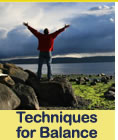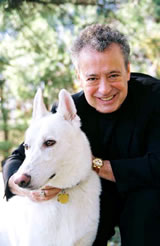    
Balancing Act: The Newsletter (No. 137: January 2011) Follow me on Twitter! You can find me here: New consulting and leadership tips posted daily! And find me on Facebook:  Holiday Techniques for Balance Here’s what I think are examples of what I’d call “class,” which is manifest by a balanced and confident life:
 There are a lot of conspiracy theories. Was it Fidel Castro or the mafia, or just a deranged gunman who shot President Kennedy? Are college campuses inordinately influenced by leftist professors? Is the Tea Party really an artifact of hidden, wealthy interests? Are the Golden Globe Awards really decided by who best wines and dines the foreign press voters? Did Bristol Palin survive to the semi-finals on Dancing With the Stars (AKA: Dancing With the Vaguely Familiar) because of a voting cabal formed by her mother’s supporters? I don’t know about you, but I’m already exhausted! Without commenting on the legitimacy or relative probabilities of these and other conspiracy beliefs, I will share my observation about what these positions all have in common: a feeling of personal weakness and ineffectiveness, that creates paranoia. This can become quite serious, since there are children dying of polio and measles in Africa in areas where the conspiracy belief is that the vaccinations are attempts to give people AIDS or otherwise enslave them. I remember receiving a newsletter which strongly warned me against traditional rabies and distemper preventatives for my dogs, citing them as more dangerous than the diseases themselves, and advocating some kind of naturalistic prophylactic approach. There is zero evidence for such a position, which is easy to empirically prove or disprove. I’m not endangering my dogs’ health because someone believes in the inexplicable. Yet people create, support, and are directed by conspiracy psychology because they really feel weak and ineffectual and are seeking some reason outside of themselves for their perceived position. On a global scale, some cultures and governments are driven by this vast feeling of insecurity, blaming others for their own woes, and even provoking hostile acts driven by the conspiracy beliefs. On our individual levels, the ability to empower ourselves, to feel in control of our lives, to correctly anticipate and plan for the future, will pretty much obviate the need to create conspiracy theories. Once you achieve that level of self-awareness and control, you realize that the people at the club aren’t trying to freeze you out of the committee; the investment counselor has not used your funds just to boost commissions; the teachers haven’t taken retribution against your child for your position in a public meeting; and the officials were not on the take when the home team lost. Conspiracy creation and adherence require a lot of work. Working with the facts requires a lot of confidence. The choice is ours.  The human condition: Crime and No Punishment A psychiatrist named Walter Bromberg wrote once that “society loves its crime but hates its criminals.” I cited him in October in one of Alan’s Monday Morning Memos®. Yet, I beg to differ. I’ve been thinking about the fabulous cable series The Sopranos, which had a long, critically-acclaimed run that made the mafia look like the folks next door (which they were). Currently, there is a brilliant series on HBO called Boardwalk Empire with a faithful, multi-million dollar reproduction of a portion of Atlantic City’s boardwalk in the early 1920s. Steve Buscemi (who also had a role in The Sopranos) brilliantly leads a cast of the corrupt doing battle with the unethical. I realize I’m probably unbalanced arguing with a psychiatrist, but I think that we tend to love our criminals while hating our crime. In my view, the most reprehensible character on Boardwalk Empire is the zealous federal agent pursuing the bootleggers (this is the dawn of Prohibition in the U.S.), who breaks laws and commits murder because his cause is “just”. There is quite a bit of sympathy for Buscemi, who peels hundred dollar bills from a huge wad he keeps in his pocket whenever he feels a sympathetic twinge for someone. And we tend to take his side against the New Yorkers trying to horn in on his liquor enterprises. (He saves himself by keeping Nicky Arnstein out of jail for fixing the World Series!) Today, we’re more bemused by bank robbers than scared of them (at least, if we’re not in the bank at the time). We’re not amused by the Somali pirates, but we have a soft spot for the old swashbuckling type. As long as we’re not behind them and it’s not our line, we grudgingly admire the people who cut-in to long lines to avoid the wait. (I’d cut TSA every time, if I could.) I’m told that people often brag about exceeding the speed limits all the way home from a trip, even surpassing 100 mile per hour. Imagine? There is something about the crafty criminal, especially if there’s a “good heart” or engaging salutary human characteristics that enders this person to many of us, despite the criminal acts. After all, we witness cheating in sports all the time—hand balls in soccer, subtle pass interference in football, doping in cycling, underage gymnasts, and Derek Jeter of the Yankees accepting a base for a pitched ball that hit his bat, not his body. Well, as legend has it during that very real fix of the 1919 World Series, a young boy on the courthouse steps yelled at his hero “Shoeless” Joe Jackson, “Say it ain’t so, Joe!” But I’m afraid it is. We’re all somewhat fascinated by the dark side, and where daylight becomes twilight. APPROACHING GREAT STUFF:
JOIN ALAN'S FRIDAY WRAP�
|
Copyright 2011 Alan Weiss. All rights reserved.

Balancing Act® is our registered trademark. You are encouraged to share the contents with others with appropriate attribution. Please use the ® whenever the phrase "Balancing Act" is used in connection with this newsletter or our workshops. Join the Friday Wrap� Weekly, 15-minute podcasts with segments on current business events, new intellectual property, and some humor. Monthly, ten-minute videos on business and self-development. And a full-day, free conference in mid-year. Three full work days—24 hours—of programming for a few dollars an hour in investment. And join us in October for 25-40% discounts AND a free, new book! Get this weekly booster shot right away. Commences in January, but we have a complimentary demo for those interested. 2011 Teleconference Series
I've designed the next teleconference series around most frequently requested topics. Some topics, such as "Power Language," I'll take to the next level. New ones, such as "Story Telling," I'll deal with from the ground up. This is approximately ten hours of high-end development available live, on recording, and by download, all for a single investment. The Odd Couple®Las Vegas, NV,
|
| Having problems viewing this email, click
here. |
|
P.O. Box 1009 � East Greenwich, RI 02818-0964 � Telephone: (401) 884-2778 � Fax: (401) 884-5068
All Rights Reserved. Copyright 2011 Summit Consulting Group
ISSN 1934-3116













